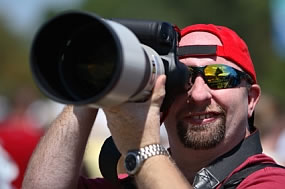Careers Behind the Camera
Photography is one of the most varied and dynamic career fields. It offers a plethora of career opportunities, and depending on what field you choose the education you ultimately will need can vary as well. Professional photographers create a vast array of pictures that can be seen in everything from photo albums and magazines, to museums and art collections.
 Professional photography is a highly competitive field, mostly because it is such an enjoyable hobby and many people attempt to turn this hobby into a career. The most available opportunities: travel photography jobs, event photography jobs and seasonal photography jobs (Santa pictures anyone?). However, other areas require at least an undergraduate degree in photography, while others require terminal degrees.
Professional photography is a highly competitive field, mostly because it is such an enjoyable hobby and many people attempt to turn this hobby into a career. The most available opportunities: travel photography jobs, event photography jobs and seasonal photography jobs (Santa pictures anyone?). However, other areas require at least an undergraduate degree in photography, while others require terminal degrees.
Photography involves scouting a location, working with editors and art directors, setting up lighting, operating a camera, directing models and selecting the necessary cameras, lenses, films, etc. It is a complex job that often requires more than creative skill to succeed. See our page on modeling photography in another section of JobMonkey.
Some photographers shoot in digital, while others choose to shoot using silver-halide film and papers. Digital photography is easier and often much cheaper than film and for most beginning professional photographers, using digital technology makes more sense. Some photography careers will require the knowledge and technical use of digital and film photography. For example, photography professors often teach both techniques. Some schools, however, have begun phasing out general instruction on silver photography, offering these lessons for specialty and advanced courses only. However, photography curators and archivists will often work with silver-halide photographs to preserve these images, so a cursory knowledge is important.
There are a few careers in photography in which you will rarely have to take a picture. Nevertheless, technical knowledge and creative skill is still important.
Most professional photographers are self-employed and work on a freelance basis. Their work is contracted by a variety of companies, including: magazines, Web sites, catalogues, corporations, design models, architects, corporations, etc.
Photographers may also work regular full-time jobs at for advertising agencies or at magazines as photo editors.
The most successful professional photographers are those that combine that technical skill, creativity with business savvy.
In fact, business skills like networking, marketing, etc. are key factors in determining whether one will be successful as a photographer.
Another important factor in determining one’s success as a professional photographer is the strength of the portfolio. A photographer’s portfolio can, in most cases, determine whether one is commissioned for a job or not. The portfolio can be in print format or in digital and it is not uncommon for professional photographers to have both formats. Portfolios are always changing and evolving. Professional photographers add and subtract images based on their most recent and best work.
Sometimes photographers have multiple portfolios and put them together based on a variety of themes. This is common for freelance photographers, because their clients can vary greatly.
If you are interested in working as a photographer, the most important thing that you can do is research what fields you might be interested. These photography careers each have their own professional organization or association and can offer beneficial information. Look at some of the following careers and do some research on your own to determine which photography career is right for you.


 Teach English in Asia
Teach English in Asia  Cruise Ship Jobs
Cruise Ship Jobs  Alaska Fishing Industry Jobs
Alaska Fishing Industry Jobs  Sharing Economy / Gig Economy
Sharing Economy / Gig Economy